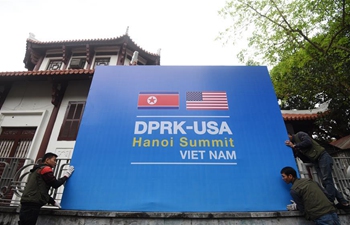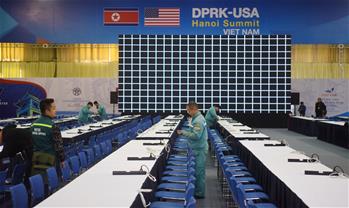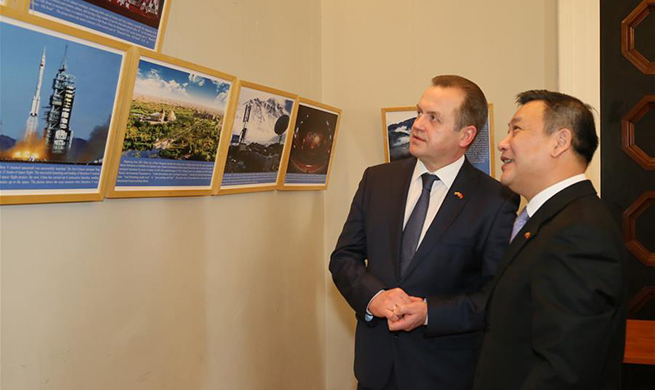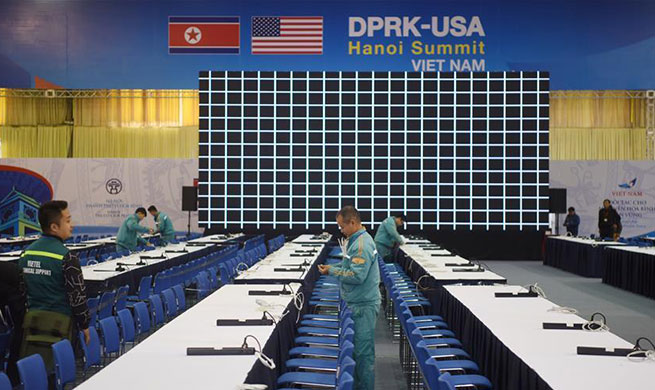HELSINKI, Feb. 26 (Xinhua) -- The pitfalls and promises of artificial intelligence (AI) were reviewed at a high level conference arranged by Finland and the Council of Europe (CoE) that began here Tuesday.
In tens of speeches heard by over 300 participants from the 47 CoE countries, AI was painted both as "a threat to democracy" but also as a possibility to improve "the appreciation of democracy" among the population and enhance the competitive edge of Europe.
Finland is the current chairman of the Council's Committee of Ministers. Council of Europe comprises 47 countries.
Opening the conference, Finnish Foreign Minister Timo Soini said the discussions in Helsinki focus on the impact of AI on European core values, the human rights and the rule of law.
Soini noted two recent measures related to AI. Last December, CoE's Commission for the Efficiency of Justice adopted the first European ethical principles related to the use of artificial intelligence in the judicial systems. And two weeks ago, the CoE's Committee of Ministers encouraged the member states to assume their responsibility to address the threat of machine learning tools used to manipulate and control economic, social and political behavior.
Dunja Mijatovic, CoE's Human Rights Commissioner, underlined that since national governments bear the responsibility to protect human rights, it is their duty to ensure that private companies which design, develop or use AI systems do not violate human rights standards.
She called for more resolute contacts with tech industries to make them aware of the necessity to incorporate human rights in the design of AI systems. "AI literacy should be promoted among the population in order to help people understand how it works, and recognize when it harms."
HELP IN POLITICS
Francois Friedrich, head of the division of electoral assistance at the CoE Directorate General, underlined the possibilities that AI opens for improving the trust of people in the political system.
He noted that voter turnout in the general elections in the CoE member countries has declined during the past 20 years from 77 to 64 percent. He saw this as a sign of mistrust in "representative democracy".
"With AI, new opportunities for participation could be created and the confidence gap mended," he said.
Friedrich referred to the recent news about procedures to influence voters through social media, but said the ultimate benefits from AI would outweigh the hazards. "We can reverse the risks of interference," he assured.
He also mentioned the possibilities AI opens in voting security and voter identification and in the post-balloting complaints and appeals.
AI ETHICS TO BE A EUROPEAN HALLMARK
Pekka Ala-Pietila, chairman of a European Union expert group on artificial intelligence, talked about of his group that creates AI guidelines.
A draft completed in December attracted 500 comments. The guidelines are to be published in April. Further policy and investment recommendations will be added later.
Ala-Pietila was optimistic about the chances of Europe becoming a world leader in advancing the ethical use of AI. He acknowledged that Europe has lost the consumer market level of AI "mainly to China and the US". But Europe still has the "business-to-business" sector.
He saw "fantastic opportunities" for Europe in the "public-to-citizen" services. Ala-Pietila, envisaged a ten-year program for Europe. "We could coin "made in Europe".
He underlined that ethics and competitiveness go hand in hand. "You cannot be competitive without ethics".
Wolfram von Heynitz, head of the Cyber Policy Coordination Staff at the German Foreign Office, remarked that rules and competitiveness are not mutually exclusive. He said that "good rules" would make Europe competitive.
Von Heynitz said Europe could become a role model in AI for many countries. He made a comparison to the recent introduction of the European data protection rules and the current discussion in the United States about would-be national norms. "Even American companies are asking for a model that looks like GDPR," he said.
The conference continues on Wednesday, with a debate on AI and the rule of law.













